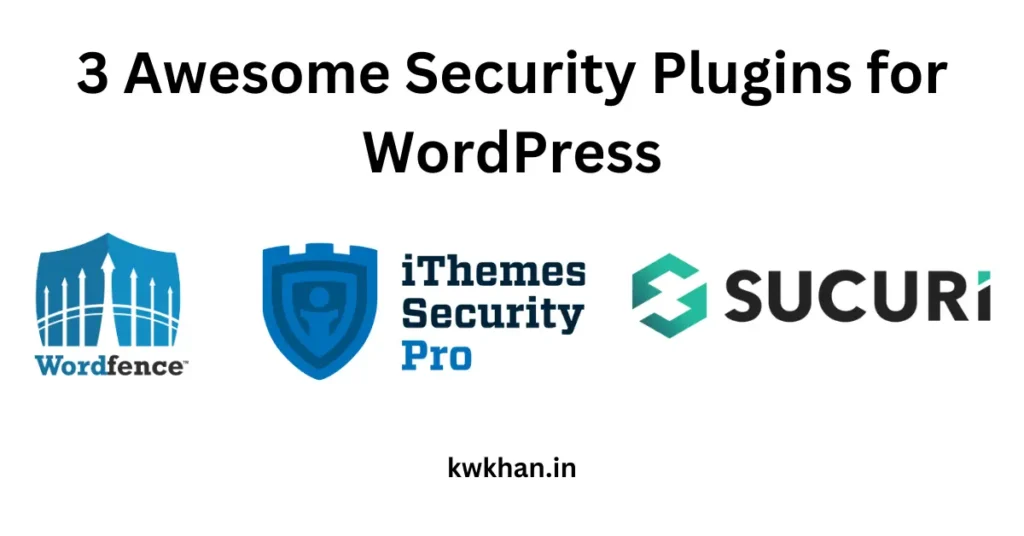Why WordPress Security is Crucial
WordPress Popularity & Vulnerability: Start by explaining that WordPress powers over 40% of websites worldwide. Its popularity makes it a prime target for hackers, leading to various types of security threats like malware, brute-force attacks, and phishing scams.
Why Security Plugins Matter: Briefly introduce the concept of security plugins as essential tools for website owners to protect their sites from common security vulnerabilities.
Promise of the Post: State that you’ll introduce readers to three exceptional security plugins that offer comprehensive protection, are user-friendly, and will enhance their website’s safety.
Understanding WordPress Security Threats
Types of Common Threats:
Malware and viruses.
Brute-force attacks aimed at guessing login credentials.
SQL injections and cross-site scripting (XSS).
Backdoors and unauthorized access.
Real-life Consequences of Insecurity: Give examples of what can happen if a site is compromised, such as loss of data, decreased SEO rankings, or damage to brand reputation. This can motivate readers to take action.
Criteria for Choosing a Security Plugin
- Features to Look For:
- Real-time monitoring.
- Firewall and malware scanning.
- Login protection and two-factor authentication.
- Regular updates and customer support.
- Ease of Use and Performance Impact: Security plugins shouldn’t slow down the website. Mention how the three plugins you’ll discuss strike a balance between powerful protection and efficiency.

Plugin #1: Wordfence Security
- Overview of Wordfence:
- Explain that Wordfence is one of the most popular and robust security plugins, with over 4 million active installations.
- Key Features:
- Firewall: Blocks malicious traffic, preventing unauthorized access.
- Malware Scanner: Scans files, themes, and plugins for known malware.
- Login Security: Protects against brute-force attacks with two-factor authentication and reCAPTCHA.
- Real-time Threat Defense Feed: Gets instant updates on new security threats.
- Benefits of Using Wordfence:
- Helps prevent common vulnerabilities by blocking IPs, offering brute-force protection, and maintaining a comprehensive activity log.
- Installation and Setup Tips: Guide readers through the basic installation and setup process, explaining any recommended settings for maximum security.
Plugin #2: Sucuri Security
- Overview of Sucuri:
- Describe Sucuri as a powerful security solution offering both a free and premium version, known for its strong malware protection and firewall features.
- Key Features:
- Website Firewall: Blocks harmful traffic and stops DDoS attacks.
- File Integrity Monitoring: Checks for unauthorized file modifications.
- Security Notifications: Sends alerts for suspicious activities.
- Blacklist Monitoring: Monitors blacklists to ensure the site’s reputation remains intact.
- Benefits of Using Sucuri:
- Sucuri’s cloud-based firewall optimizes site performance while keeping threats at bay. It’s a strong choice for business sites needing reliability and strong support.
- Installation and Setup Tips: Offer step-by-step setup instructions, including configuring notifications and using Sucuri’s scanning features.
Plugin #3: iThemes Security
- Overview of iThemes Security:
- Explain that iThemes Security, formerly known as Better WP Security, is a popular plugin offering 30+ ways to secure WordPress sites.
- Key Features:
- Two-Factor Authentication: Enhances login security.
- Database Backups: Regularly backs up site databases, ensuring easy recovery.
- 404 Detection: Detects suspicious users scanning for vulnerabilities.
- Brute Force Protection: Limits login attempts and blocks offending IPs.
- Benefits of Using iThemes Security:
- Suitable for users who want a blend of proactive and responsive features. iThemes provides many options for customization.
- Installation and Setup Tips: Include a guide to configuring login protection, setting up regular backups, and customizing security alerts.
Comparison Table of the Three Plugins
Create a comparison table summarizing key features like malware scanning, firewall protection, login security, ease of setup, and cost.
Other Noteworthy Security Tips
Additional Best Practices: Encourage readers to complement these plugins with other strategies, like keeping WordPress and plugins updated, using strong passwords, limiting admin accounts, and disabling file editing.
The Role of Hosting: Mention that good web hosting with built-in security layers also helps protect websites.
Conclusion: Choosing the Right Security Plugin
Summing Up: Reiterate the importance of website security and highlight that any of these plugins will strengthen a site’s defenses.
Final Recommendation: Encourage readers to choose a plugin that fits their needs and technical comfort level. Suggest that they try out a couple of plugins and see which one best suits their requirements.
WordPress is one of the most popular content management systems, making it a frequent target for hackers. A security plugin helps protect your site from threats like malware, brute-force attacks, and unauthorized access by adding features like firewalls, malware scanning, login protection, and more. Security plugins are essential for both small blogs and business sites to keep data secure and maintain site performance.
Free security plugins can offer decent protection and are often enough for basic sites or personal blogs. However, premium versions typically offer advanced features such as real-time updates, firewall protection, and priority support. For high-traffic sites or e-commerce stores that deal with sensitive customer data, investing in a premium security plugin is often worthwhile for enhanced protection.
Each of these plugins offers strong protection, but the best choice depends on your site’s specific needs. Wordfence is known for its comprehensive firewall and malware scanning, Sucuri for its cloud-based firewall and DDoS protection, and iThemes Security for its login security features and database backups. Compare their features based on what’s most important for your site, such as ease of use, real-time protection, or specific threat monitoring.
Some security plugins may impact site speed, especially if they’re scanning large amounts of data frequently. However, many plugins like Wordfence, Sucuri, and iThemes Security are optimized to minimize performance impact. Choosing a plugin with a well-configured firewall, using only necessary features, and avoiding plugin overload can help maintain site speed.





